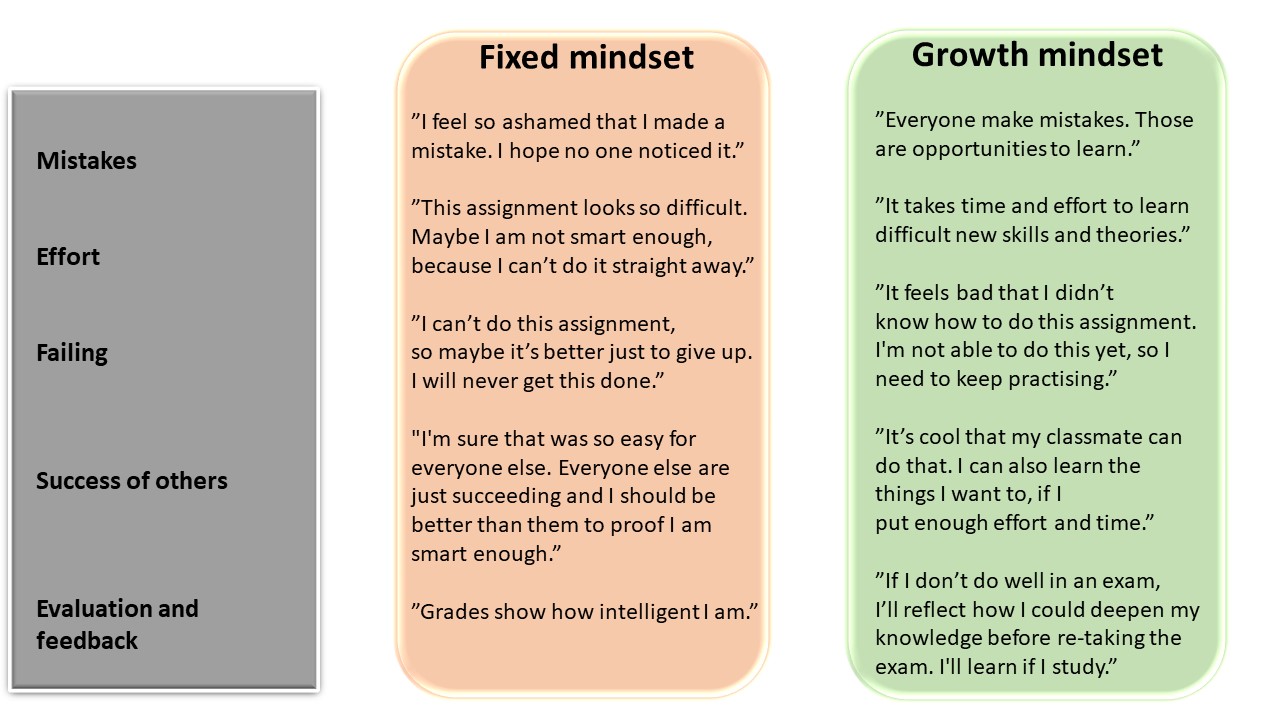CS-CV0005 - Mind & Study - toolbox for being well in studies, Lectures, 26.2.2024-21.4.2024
Kurssiasetusten perusteella kurssi on päättynyt 21.04.2024 Etsi kursseja: CS-CV0005
Fixed mindset and growth mindset for learning
We started with a poll: Which of these attitudes sounds more familiar to you?
- I have always been good at certain things and bad at others. In the exam, I prove how good or bad I am at the subject in question. If I fail, I feel like I'm just not smart enough.
- I believe I can learn almost anything with enough practice. When I fail, I feel that it provides an opportunity to improve. My effort and attitude affect my success in studies more than my intelligence.
What do you think about learning?
Certainly many things affect how well you do in your studies. Many skills, such as self-motivation, emotional skills, achievement and time management skills, and effective study techniques are connected to academic success. These are all skills that can be practiced, and these affect success in studies more than intelligence. However, many students recognize that they have beliefs that inhibit learning. For example, the belief "I've always been bad at math" may have been a barrier for a long time, and in the background, affected negatively every math learning situation.
Psychologist Carol Dweck has developed a theory of the two attitudes (mindsets) described below for learning. Attitudes describe how we think about talent, abilities, and learning. Attitudes may vary depending on what we should learn. You can read more about them here:
Fixed mindset
The attitude of fixed mindset is illustrated by the metaphor of a card game, where the cards have been dealt once and can’t change them during the game. So, the player has to constantly prove whether their cards are good enough. In a fixed mindset, this idea applies to different abilities, such as creativity, intelligence or entrepreneurship. This kind of attitude affects the way people act when facing challenging situations or when they make mistakes: they give up easily and are more prone to avoid challenges. Failure feels like a proof that your cards just aren't good enough. This also leads to the fact that you must constantly evaluate your own abilities and many situations start to feel like test-situations. This can make the student feel that they are only as smart as their last exam grade. The attitude also affects how a person relates to the success of others. The success of others in an exam, for example, can feel like a threat, because this attitude encourages comparing oneself to others.
Growth mindset
The attitude of growth is illustrated by a card game where the cards in the hand are only the starting cards and more cards are added to the hand during the game. At the core of the attitude of growth is the idea that by making an effort we can improve our skills, and that every time we study difficult things, new connections are created in the brain. This affects the fact that when faced with difficult tasks, you should not give up, but rather try persistently again. Also, making mistakes doesn't feel as holistic, because a mistake doesn't tell us everything about our abilities, but can be an opportunity for us to learn. At the moment of failure, a person with a growth attitude can remind themself that even though failure may feel miserable, it is an opportunity to pause and think about what one could do differently next time. The attitude of growth also affects how the success of others feels: it can be inspiring and tell us something about what perhaps we ourselves would like to learn.

In the individual assignment, think about the situations in which you recognize in yourself beliefs in accordance with the attitude of fixed or growth mindset. How do these beliefs affect your actions? Submit a reflection text on the topic of a maximum of one page.
